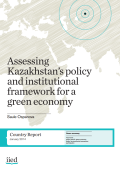
Kazakhstan has taken a lead among Central Asian countries in mapping a path towards a green economy. While environmental degradation has often been discussed, only recently have environmental concerns begun to be addressed within the mainstream economy. In 2011 the Kazakhstan government asked IIED to help define its approach to ‘greening’ the economy. Focused initially on the Green Bridge Partnership Programme of investments, in a positive step the Kazakhstan government adopted its own Green Economy Concept, which provides the overall policy context. This report analyses progress to date and makes ten recommendations on the enabling conditions needed for Kazakhstan to achieve a substantial transition to a green economy.
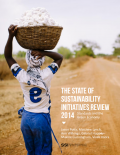
The past decade has seen a rapid expansion in the development of voluntary sustainability standards (VSS) to address key sustainability issues for commodity supply chains. Major growth in the production and sales of certified/verified agricultural products has been fuelled by increasingly ambitious private sector sourcing commitments, particularly among blue chip companies.
This Review provides a bird’s eye view of the global market trends of 10 commodities and the 16 most prevalent standards initiatives paving the way for more sustainable production and trade. The review looks at the governance, criteria coverage and implementation practices of standards initiatives that are active in the agriculture, forestry and biofuels sectors. The standards initiatives studied had certified/verified production with an estimated trade value of US$31.6 billion (2012).
This Review is a strategic planning tool for businesses, policy makers and stakeholders seeking to build more sustainable supply chains. The Review is a collaborative effort of IISD, IIED, FAST, ENTWINED and IDH.
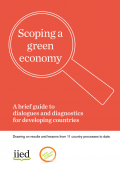
This guide aims to encourage early dialogue and diagnosis in and by developing countries on what a green economy would mean for their country.
Green economy and green growth are hot topics. Definitions, evidence, debates and increasingly, policies, have tended to be dominated by powerful countries and international groups. Several intergovernmental organisations are making it a priority and are announcing policies and programmes; but they each have different approaches.
This proliferating work on the international scene provides rich material which can be highly influential in developing countries. However, there are risks of considerable bias if the concepts are not first explored by stakeholders in-country. As the 2012 Rio+20 United Nations Conference on Sustainable Development concluded, green economies should take very different forms according to a country’s diverse capital endowments and needs. As such, green economic policy and investments need to be tailored at both national and local levels.
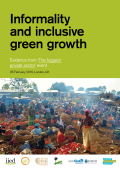
‘The biggest private sector: what place for the informal economy in green and inclusive growth?’ was a conference held in London in February 2016 which aimed to build a new policy agenda for integrating the informal economy into inclusive green growth and sustainable development.
The conference was co-hosted by IIED, the Green Economy Coalition (GEC), Women in Informal Employment: Globalising and Organizing (WIEGO), the Center for International Forestry Research (CIFOR), the Organisation for Economic Co-operation and Development Sahel and West Africa Club (OECD-SWAC).
Featured speakers included researchers, policy makers and practitioners from Brazil, Ethiopia, Ghana, Indonesia and South Africa. Together, participants demonstrated the variety and vigour of informal economies around the world, shared lessons and benefits, explored challenges for formalisation and highlighted success stories.
This document captures some of the evidence and insights presented at that event and expands on the six guiding principles that emerged from the discussions:
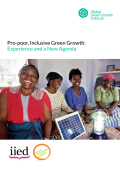
Green growth initiatives to date have often placed the economy and environment front and centre. However, for green growth to fulfil its promise, it needs to also focus on people and address systemic causes of poverty and social exclusion.
Green growth that does not deliver benefits to all stakeholders will not lead to the kind of transformative change envisioned by the global community and outlined in the Sustainable Development Goals.
The ‘Pro poor, inclusive green growth’ report demonstrates how green growth can address some of the drivers of poverty and social exclusion.
Published by the Global Green Growth Institute (GGGI) in association with the International Institute for Environment and Development (IIED) and the Green Economy Coalition (GEC), the report stresses that to be effective green growth strategies will need to strengthen institutional and governance structures and respond to people’s needs.
Drawing from a number of case studies the publication provides practical steps for policymakers, business and civil society to work together to deliver inclusive green growth.
